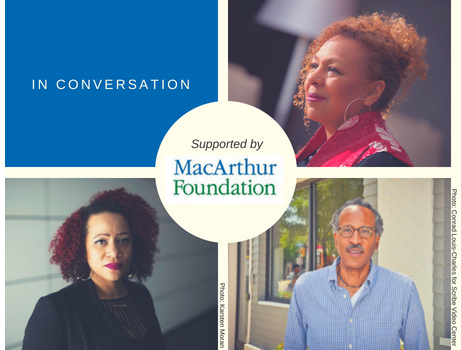In Conversation: MacArthur Fellows - Kellie Jones, PhD, Nikole Hannah-Jones and Louis Massiah

Icons in the fields of art history, documentary filmmaking and journalism discuss and explore their visionary work and its intersections with art making, social justice, and history. Addressing current issues of the past and today New York Timesinvestigative reporter, Nikole Hannah-Jones will discuss how her voice is reshaping conversations on education; Columbia University art history professor Kellie Jones, PhD, will present on artist “Charles White, Feminist at Mid-Century,” and Louis Massiah, founder and director of Scribe Video, will discuss the role of video as an artistic tool for change and self-determination in his talk “The Documentary of Utility - A Creative Practice.”
Please RSVP: nyuiaaa-cbvc-events@nyu.edu or (212) 998-IAAA(4222)
Dr. Kellie Jones is a Professor in Art History and Archaeology and a Faculty Fellow with the Institute for Research in African American Studies at Columbia University. Her research interests include African American and African Diaspora artists, Latinx and Latin American Artists, and issues in contemporary art and museum theory. Dr. Jones has received numerous awards for her work from the Hutchins Center for African and African American Research, Harvard University; Creative Capital | Warhol Foundation Arts Writers Grant and a term as Scholar-in-Residence at the Terra Foundation for American Art in Europe in Giverny, France. In 2016 she was named a MacArthur Foundation Fellow. Dr. Jones’s writings have appeared in a multitude of exhibition catalogues and journals. She is the author of two books published by Duke University Press, EyeMinded: Living and Writing Contemporary Art, and South of Pico: African American Artists in Los Angeles in the 1960s and 1970s, which was named a Best Book of 2017 in Artforum and a Best Art Book of 2017 in The New York Times. Dr. Jones has also worked as a curator for over three decades and has numerous major national and international exhibitions to her credit. Her exhibition “Now Dig This! Art and Black Los Angeles, 1960-1980,” at the Hammer Museum, Los Angeles, was named one of the best exhibitions of 2011 and 2012 by Artforum, and best thematic show nationally by the International Association of Art Critics. She was co-curator of “Witness: Art and Civil Rights in the 1960s” (Brooklyn Museum), named one the best exhibitions of 2014 by Artforum.
Nikole Hannah-Jones is an award-winning investigative reporter who covers civil rights and racial injustice for The New York Times Magazine. In 2016, she helped found the Ida B. Wells Society for Investigative Reporting, a news trade organization dedicated to increasing the ranks of investigative reporters of color. She is also writing a book on school segregation called, The Problem We All Live With, on the One World imprint of Penguin/Random House. Hannah-Jones got hooked on journalism when she joined her high school newspaper and began writing about students like her, who were bused across town as part of a voluntary school desegregation program. Her heroes are the race beat reporters, such as Ida B. Wells, Ethel Payne, Simeon Booker and Claude Sitton, whose fearless coverage helped move this nation closer to its promise. Prior to joining The New York Times, Hannah-Jones worked as an investigative reporter at ProPublica in New York City, where she spent three years chronicling the way official policy created and maintains segregation in housing and schools. Before that, she reported for The Oregonian in Portland, where she covered numerous beats, including demographics, the census and county government. Hannah-Jones started her journalism career covering the majority black Durham Public Schools for The News & Observer in Raleigh, N.C. During her three years there, she wrote extensively on issues of race, class, school resegregation and equity. Hannah-Jones is a native Iowan, a child produced by the hopes of both the Great Migration and those who migrated from foreign shores. Now she is Bed-Stuy fly in Brooklyn, where she shares a home with her husband and very sassy daughter.
Louis Massiah is a documentary filmmaker and the founder of the Scribe Video Center in Philadelphia, a media arts center that provides workshops and equipment access to community groups and emerging independent media makers. A MacArthur Foundation Fellow, Massiah has developed community media production methodologies that assists first time makers use media as a creative tool for authoring their own history including the Precious Places Community History project, a documentary video project produced collaboratively with over 90 neighborhood organizations in the Philadelphia area; the Muslim Voices of Philadelphia community history project and the Great Migration - A City Transformed. Massiah’s award-winning documentaries, which include The Bombing of Osage Avenue, W.E.B. Du Bois – A Biography in Four Voices, two films for the Eyes on the Prize II series, and A is for Anarchist, B is for Brown, have been broadcast on PBS and screened at festivals throughout the US, Europe and Africa. He also has produced the five-channel permanent video installation for the National Park Service’s President’s House historic site.
Sponsored by Institute of African American Affairs + Center for Black Visual Culture
Supported by John D. and Catherine T. MacArthur Foundation
The John D. and Catherine T. MacArthur Foundation supports creative people, effective institutions, and influential networks building a more just, verdant, and peaceful world. MacArthur is placing a few big bets that truly significant progress is possible on some of the world’s most pressing social challenges, including over-incarceration, global climate change, nuclear risk, and significantly increasing financial capital for the social sector. In addition to the MacArthur Fellows Program, the Foundation continues its historic commitments to the role of journalism in a responsible and responsive democracy, as well as the strength and vitality of our headquarters city, Chicago.
MacArthur is one of the nation's largest independent foundations. Organizations supported by the Foundation work in about 50 countries. In addition to Chicago, MacArthur has offices in India, Mexico, and Nigeria. www.macfound.org